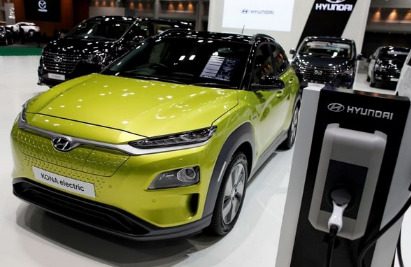By B.N. Frank
Battery fires have led to a recalls in Hyundai Electric Vehicles (EVs) as well as some Chevrolet Bolt models. Last month, GM issued a second recall of 2017-2019 Chevrolet Bolt models. Now the company has issued a recall of ALL Bolts.
From Yahoo:
GM Recalls Every Chevy Bolt Made over Battery Fire Risk
GM expands recall to all Chevrolet Bolt model years over battery fire risk—including the new EUV crossover—and plans to replace all battery modules.
- The automaker warns owners to set vehicles to a 90-percent state of charge limitation with Target Charge Level mode, and not leave cars charging indoors overnight.
- The recall is expected to cost an additional $1 billion, adding significant costs to an already expensive recall program.
GM is expanding a recall for a battery compartment fire risk to all Bolt models produced to date, adding 2019-2022 model year Chevrolet Bolts to the list of vehicles whose battery modules it plans to replace. The move will add some 73,000 vehicles to the number of recalled cars including the recently launched Bolt EUV, more than doubling the size of the recall, which previously stood at 69,000 vehicles worldwide. The automaker said that the batteries in Bolt vehicles could have two manufacturing defects, including a torn anode tab and a folded separator in the same battery cell, which increases the risk of a fire.
GM said that a closer investigation into the manufacturing processes at battery maker LG showed manufacturing defects in a wider portion of batteries than were originally discovered.
“Out of an abundance of caution, GM will replace defective battery modules in Chevrolet Bolt EVs and EUVs with new modules, with an expected additional cost of approximately $1 billion,” the automaker said, adding that it is pursuing commitments for reimbursement from LG.
The scope of the recall will add 9335 Bolts from the 2019 model year sold in the US and Canada, as well as 63,683 vehicles from the 2020-2022 model years, including the Bolt EUV. The EUV crossover has been on sale for just a few months, having debuted earlier this spring.
The effort is expected to require a sharp increase in battery cell production by LG, as now several years worth of Bolt battery cells will have to be replaced. GM did not give an estimate regarding how long it will take LG to produce all the battery cells needed to carry out the complete process at no cost to vehicle owners, but the recall process itself is expected to take some time.
In the meantime, GM is asking all Bolt owners to set their vehicles to a 90-percent state of charge limitation by using the Target Charge Level mode in the vehicle. The automaker has posted instructions on how to do this on the recall page. GM says that customers can visit a dealer to have this setting enabled, if they feel uncomfortable making this change. GM is also asking owners to charge their Bolts more frequently and to avoid depleting the battery below 70 miles of remaining range. The automaker is also asking owners to park their vehicles outside immediately after a charging session, and not to leave the Bolts charging indoors overnight.
“To provide customers peace of mind, batteries with these new modules will come with an 8-year/100,000-mile limited warranty (or 8-year/160,000 km limited warranty in Canada),” GM added.
Needless to say, this represents a very substantial step for GM following an earlier recall that was thought to have addressed the issue successfully. The prior recall effort was prompted by an NHTSA investigation in October 2020 after reports of two Bolt fires involving vehicles from the 2018 and 2019 model years. In those instances, fires in those vehicles began under the rear seat while the vehicles were unattended, but the overall impact on the vehicle population was believed to be small.
“In the three cases identified, fire damage appeared to be concentrated in the EV battery compartment area with penetration into the passenger compartment from under the rear seat,” the NHTSA said in 2020.
In July of this year GM relaunched the effort, once again targeting 2017-2019 Bolts, and provided more information about the root causes of the fire. The manufacturer said that it had identified the simultaneous presence of two manufacturing defects in the battery cell, but still said that the two were rare. In effect, it has taken a while for GM and LG to diagnose the root causes of the handful of vehicle fires, and the expansion of the recall to all Bolts ever produced represents a significant escalation. Earlier, GM planned to replace just the affected battery modules in the battery pack, but now plans to replace all of the modules. The battery pack itself will not need replacement, however.
The extent of the recall and its significant expense has the potential to cast a shadow over EVs from GM and batteries from supplier LG. After several years of Bolt production, GM is now expanding its EV lineup with the GMC Hummer models due to begin production later this year with new Ultium batteries and motors, ahead of other models from Cadillac and Chevrolet due in the near future. In the past few weeks GM said that a battery-electric Chevrolet Silverado was in the works, in addition to other electric models. The transition to EVs is expected to be one of the main themes for the automaker in the coming years.
Visit the automaker’s recall page to view more information about the Bolt recall.
Despite a reported increased demand for EVs, one study has determined that they cost up to 2.3X more to service. Yikes!
Other complaints include:
- EV batteries have been described as an “environmental disaster”
- EVs emit high levels of harmful electromagnetic radiation emissions (see 1, 2)
Article: Updated: GM Recalls ALL Chevy Bolt Models (Including EUV Crossover) Due to Battery Fire Risk
